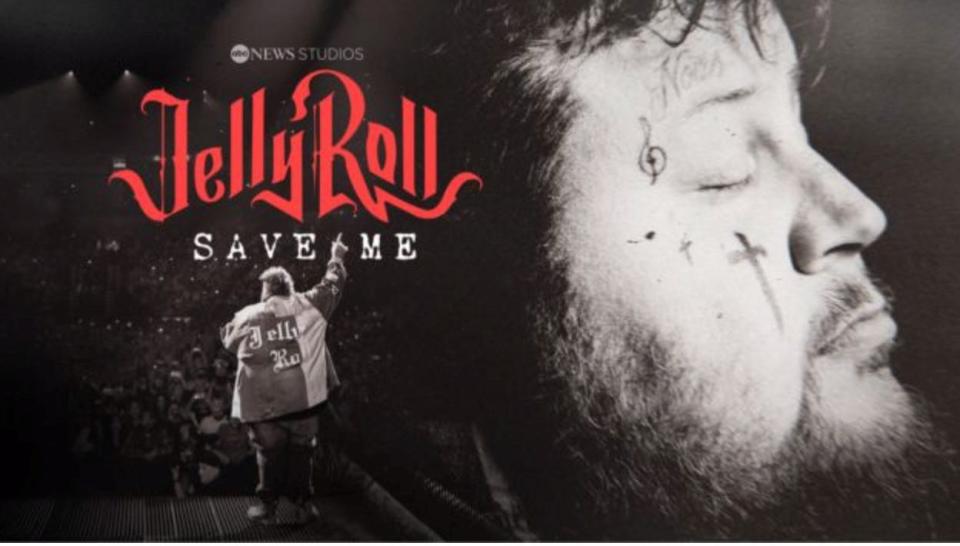Jelly Roll documentary 'Save Me' offers message of salvation greater than music
Prior to his sold-out Dec. 9, 2022 concert at Nashville's Bridgestone Arena, ABC News Studios cameras trailed Jelly Roll along his day-by-day, hand-by-hand, heart-by-heart journey to unexpected country music stardom.
The result of the journey, a documentary entitled "Save Me," debuts via streaming platform Hulu on May 30.
The film is described as a portrait of a "raw and unflinching artist, incarcerated as a teen and adult," who now "(uses) the power of his platform to raise awareness and funds for at-risk youth across the country." It also highlights how the hour and half-long feature "balances (his) life on tour with his philanthropic work, including visiting the juvenile detention facility where he was incarcerated multiple times to share his story and inspire positive change."
See the video: King Charles' guards pay tribute to Tina Turner at Buckingham Palace
Renaissance performance: Beyoncé and Tina Knowles-Lawson praise Blue Ivy Carter

The film serves as well as a highlight reel of extraordinary moments, including his October set at Colorado's picturesque Red Rocks Amphitheater and his trip down the red carpet a month later at the 2022 Country Music Association Awards.
However, even deeper, it's best if viewed as the journey of a young man who felt sure to die but who revived himself surrounded by the unlikeliest cast of reformed ne'er-do-wells ever.

His content-creating ex-sex worker wife, Bunnie XO and daughter Baylee (whom he learned of her birth while imprisoned, for the last time, in 2009) are prominently featured. Also frequently seen is his road crew, primarily comprised of Antioch-area locals who knew the artist born Jason DeFord best amid one of the 40 times he entered jail after quitting the 9th grade.
DeFord's attempts to use street hustling as his best route to a life for which he was not proud are poignantly regarded in the film. He's cast as a young man struggling against life's flaws, surviving a life wherein he watched his divorced mother succumb to addiction to prescription pills in a community where the moribund realities of lower-middle class existences led to not just his mother being the only person held in the sway of a myriad of narcotics.
"Am I chasing a dream or running from the inevitable," Jelly Roll states in one of the film's many brutally honest revelations. He says that he feels "crushed" by the weight of the "sins" of his past that still "haunt" him.
The moment he says that his rap bravado essentially served to shield an "uncomfortable, scared child" from the limelight makes his back-to-back breakout ballads "Save Me" and "Son of A Sinner" feel more of an autobiographical revelation than the entirety of "authentic" songs occupying premium positions on Billboard's Country Airplay charts.
"Almost perfect comes around all the time, but perfect never does," says the rapper and singer about his Red Rocks performance.
To wit, a young man named Nate -- to whom Jelly Roll served as an "uncle" figure for most of his life -- was slain in South Nashville before the show. The weight of running from the certainty of a sin-filled existence in a life where bullets travel faster than feet can carry someone is profound in Jelly Roll's statement. Regardless of the many trappings of success he's afforded, life is still perpetually more bitter than sweet.

Notable too is the chronicling of Jelly Roll working with his fellow suburban Nashville resident made good, BMI's Nashville executive head of creative Shannon Sanders, on his 2022-released track "I Need A Favor" (which he debuted live at Bridgestone Arena). Sanders' connection as the choir leader of the 150-plus-year-old and Grammy-winning Fisk Jubilee Singers made the track's execution possible.
Read between the lines of the documentary and the track has a greater significance. For Jelly Roll's most engaged and vocal fans, his existence serves as the appearance of salvation against a life of crime, drugs, or socioeconomic despair.
However, for the artist himself, he's at a crossroads.
He's fully capable of saving himself. However, placing faith in spirituality to remove the fear of reliving his past while providing him the strength to live in his present as a father, husband, idol and potential superstar seems a bridge too far for him to commit entirely. He's still battling his lifelong struggle with obesity, plus he is in the midst of year 15 of a breakneck schedule of nearly 300 shows yearly (check his Twitter, even in the past weekend, he played eight shows in six states in four days) that places his health and sanity in constant polar opposition.
Jelly Roll's success is predicated on the Rumplestilskin-like ability to weave profound trauma into unprecedented gold. That metaphorical gold's ability to now put platinum-studded chains around his neck and wrists and his family in a well-appointed home means that he'll either be overwhelmed by the trauma describing pain that others typically feel but cannot state in song for a lifetime or able to evolve past himself and find peace within his remarkable rise to acclaim.

What Jelly Roll describes as an "immovable force meeting an unstoppable object" is the issue of most significant concern at the crux of the documentary because as the 90-minute film ends, the future remains unclear.
As a provocative artist at a critical time, his self-realization – on multiple levels – of salvation feels larger than music.
This article originally appeared on Nashville Tennessean: Jelly Roll documentary's message of salvation feels larger than music
